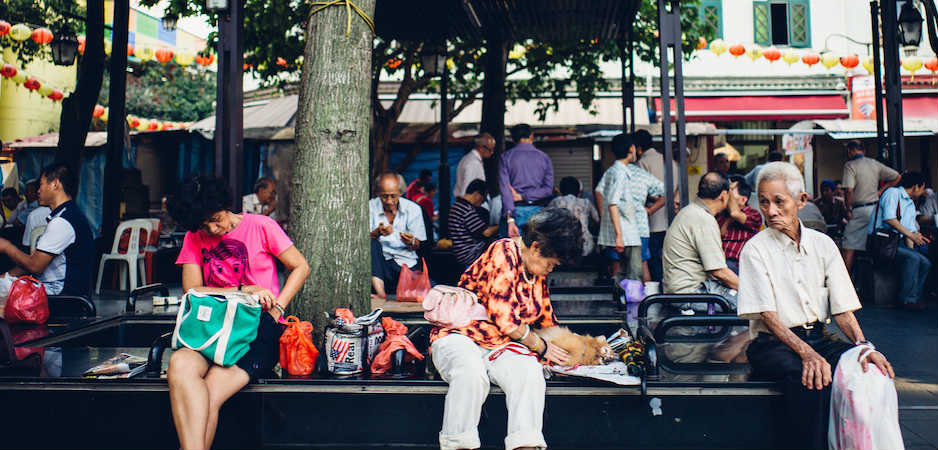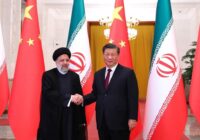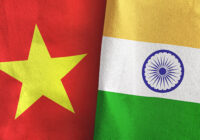Singapore is aging fast and it will need to rethink its attitude toward the welfare state.
Celebrating its 50th year of independence last August, Singapore is Southeast Asia’s second youngest nation. It is ironic, then, that its people are the oldest in the region. According to a recent report, the average age of the population has jumped to 40.7 years from 38.6 in 2010 and 36.6 in 2005.
The effects of this will be mostly economical, as pressure mounts on health care services to provide for a growing retired population. In national security, Singapore will also face a shrinking army.
Compared with the Southeast Asian median age of just 29.2 years, Singapore is aging at a worryingly fast pace. The government will need an even faster response.
By 2026, the United Nations estimates that Singapore will be a “super-aged society” with one in five persons aged 65 or over. It pegs the old-age dependency ratio as 30 dependents to every 100 working age adults. When Singapore gained independence in 1965, less than 3% of the population was 65 or above, and the dependency ratio was just five.
With fewer people in the labor force, Singapore will be worse off economically as families will be hard-pressed to find the extra cash to support graying relatives. The state will be strained too, as it will face a widening gap in tax revenue and a shrinking pool from which it can conscript troops.
The Lion City needs to effectively address the consequences of its own success. As one of the Four Asian Tigers, Singapore attained high levels of income and living standards through a combination of sophisticated manufacturing and service industries in its 50 years of existence. Singapore’s economic policies, along with a relatively peaceful international environment, have fostered a well-educated citizenry and prolonged life expectancy—all without the introduction of a welfare state.
Welfare is a dirty word among political circles in Singapore. To them, the welfare state is a lofty Western ideal that encourages idleness and undermines the competitive and thrifty nature that has been integral to Singapore’s economic growth. As an alternative to the welfare state, the nation’s approach to the provision of health care, retirement income and housing involves people being required to put aside a large portion of their income into savings plans, which they can later use to buy a home, pay tuition fees and purchase a variety of insurance policies.
This system allows the ruling People’s Action Party (PAP) to be more thrifty on social spending. Singapore’s elite assumed that the bulk of social responsibilities—childcare, for example—would be managed by tightly knit families rather than through handouts from the state. As an unintended consequence, the lack of state-provided childcare, coupled with more women in employment and education, incentivized families to have fewer children.
Singapore’s fertility rate rose slightly to 1.25 in 2014 from 1.19 the previous year, but it is still far below the desired replacement rate of 2.1. To link the welfare state with fertility rates, consider that France is exceptional in aging Europe with a high fertility rate of 2.01, due to its generous active family support policies including childcare facilities, tax allowances and benefits. As the fertility rate in Singapore falls, the society naturally ages as a result.
As Singapore’s population shrinks, the economic consequences will become serious. The core labor force, consisting of those aged between 25 and 49, will peak in 2020. Singapore will have great difficulty preserving its impressive growth rate with a shrinking labor force.
As the government’s authority relies considerably on providing high growth rates and improving the material lives of citizens, an economic slowdown could seriously damage the PAP’s hold on power and reputation.
As for defense, an economic slowdown will mean that Singapore may not be able to continue to spend between 3% to 5% percent of gross domestic product (GDP) on national security annually. Furthermore, with a shortage of young people, it will need to think of viable alternatives to a shrinking army.
A More Generous Nanny State?
An obvious response to this would be to increase the forced savings rate. However, with the rising cost of living and stagnant wages spurring Singaporeans to put away even more money for retirement, this increment will be a hard sell. Citizens must already provide for their parents, and refusing to do so may end in a long drawn out court battle.
Singapore’s government will need to think of new ways to prepare for an aging population, and it will need to rethink its attitudes toward the welfare state.
Fortunately, as one of the world’s richest nations, Singapore is in a good position to invest a higher percentage of GDP into social care. This may be in the form of paying for house servants to ease the burden of families looking after their old, or through technology. The city-state is already investing in robotics. Personal trainer robots are starting to be used to help the elderly stay in shape. To address the shrinking labor force, Singapore will need to make significant gains in labor productivity, perhaps also through robotics.
All, however, is not lost. Singapore’s rapidly aging population presents significant opportunities. Merrill Lynch, a US consultancy firm, has estimated that that the global Silver Economy will be worth $15 trillion by 2020—think fashion brands aimed at grandparents.
If Singapore is able to take the initiative in dealing with an aging population, it could pioneer measures that may be applicable within other countries as well. With Europe, China and Japan rapidly aging, Singapore is hardly alone in this predicament.
Singapore’s success over the past 50 years was against the odds. Upon independence, it had no natural resources and a population of just 1.3 million. Today, it stands as a shining example of nation-building in the 20th century. There is little reason to think that its own aging population will conquer the Lion City. Should Singapore be able to overcome this crisis, it will have more reason to celebrate.
The views expressed in this article are the author’s own and do not necessarily reflect Fair Observer’s editorial policy.
Photo Credit: aFrIcanSH
 We bring you perspectives from around the world. Help us to inform and educate. Your donation is tax-deductible. Join over 400 people to become a donor or you could choose to be a sponsor.
We bring you perspectives from around the world. Help us to inform and educate. Your donation is tax-deductible. Join over 400 people to become a donor or you could choose to be a sponsor.
Support Fair Observer
We rely on your support for our independence, diversity and quality.
For more than 10 years, Fair Observer has been free, fair and independent. No billionaire owns us, no advertisers control us. We are a reader-supported nonprofit. Unlike many other publications, we keep our content free for readers regardless of where they live or whether they can afford to pay. We have no paywalls and no ads.
In the post-truth era of fake news, echo chambers and filter bubbles, we publish a plurality of perspectives from around the world. Anyone can publish with us, but everyone goes through a rigorous editorial process. So, you get fact-checked, well-reasoned content instead of noise.
We publish 2,500+ voices from 90+ countries. We also conduct education and training programs
on subjects ranging from digital media and journalism to writing and critical thinking. This
doesn’t come cheap. Servers, editors, trainers and web developers cost
money.
Please consider supporting us on a regular basis as a recurring donor or a
sustaining member.
Will you support FO’s journalism?
We rely on your support for our independence, diversity and quality.






